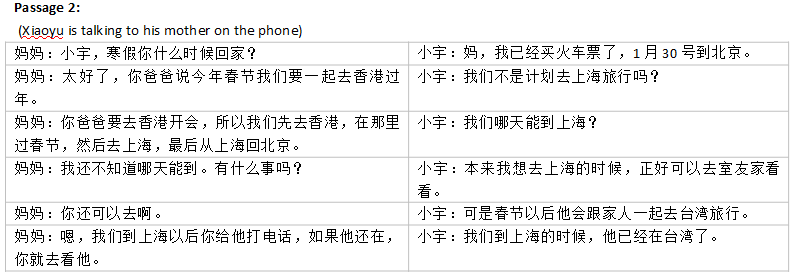beber café
What will be an ideal response?
Patricio bebe tanto café como Diego.
You might also like to view...
The way we handle time can express both intentional and unintentional messages. For instance, in a culture like ours that values time highly, waiting can be an indicator of status. "Important" people (whose time is supposedly more valuable than that of others) may be seen by appointment only, whereas it is acceptable to intrude without notice on lesser beings. To see how this rule operates,
consider how natural it is for a boss to drop into a subordinate's office unannounced, whereas the subordinate would never intrude into the boss's office without an appointment. A related rule is that low-status people must never make high-status people wait. It would be a serious mistake to show up late for a job interview, whereas the interviewer might keep you cooling your heels in the lobby. Important people are often whisked to the head of a restaurant or airport line, whereas presumably less exalted masses are forced to wait their turn. The use of time depends greatly on culture. In some cultures, punctuality is critically important, whereas in others it is barely considered. Punctual mainlanders often report welcoming the laid-back Hawaiian approach toward time. One psychologist discovered the difference between North and South American attitudes when teaching at a university in Brazil. He found that some students arrived halfway through a two-hour class and that most of them stayed put and kept asking questions when the class was scheduled to end. A half-hour after the official end of the class, the psychologist finally closed off discussion because there was no indication that the students intended to leave. This flexibility of time is quite different from what is common in North American colleges! The author thinks of "important people" as a. those who can be seen without an appointment. b. psychologists and university professors. c. people who can be intruded on without consequences. d. those whose time is very valuable.
Choose the letter (A, B, or C) that is followed by a sentence in which either the subordinating conjunction or relative pronoun is used correctly
a. The first skater performed her program while the others watched. b. The first skater performed her program as if the others watched. c. The first skater performed her program unless the others watched.
Listen to the passage once and choose the appropriate answer to the question. Then listen to the same passage again to double check your answer.

Where does Xiaoyu’s roommate’s family live?
A. Hong Kong B. Shanghai C. Taiwan
Perspectivas globales: La tecnología Tienes que escribir una serie de ensayos sobre diferentes temas relacionados con la globalización. Para el primer ensayo, tienes que explicar cómo la tecnología contribuye a la globalización. Completa los espacios en blanco con la opción apropiada.
a. asuntof. pantalla táctilm. sitios de redes socialesb. biblioteca musicalg. privacidadn. teléfono inteligentec. correo electrónicoh. salas de charlao. televisor de alta definiciónd. lector digitali. salvavidasp. texteoe. mensajería instantáneak. sistema GPSq. tuiteoLa tecnología moderna ha cumplido un papel importante en la globalización. En siglos anteriores, si una persona emigraba a otro lugar, muchas veces perdía contacto con su familia en su país de origen. En cambio, hoy, la tecnología permite que todos estemos en contacto con personas en cualquier parte del mundo. Antes, si se enviaba una carta a otro país, tardaba meses en llegar. Ahora, si mandas un 1. ______, llega casi instantáneamente. Antes, si una persona quería mantener su lengua nativa, tenía que vivir en una comunidad de inmigrantes del mismo país. Ahora, puede comunicarse con sus amigos en otros países en los 2. ______, en las 3. ______, o con la 4. ______. Incluso puede usar programas como Skype para hablar por teléfono, y ¡no cuesta nada!En épocas pasadas, si una persona quería tener acceso a los periódicos y otros medios de comunicación de un país, era necesario vivir en ese país, o quizás tener un amigo que le enviara los periódicos. Ahora, con un 5. ______, puede leer las noticias de otro país al mismo tiempo que se publica la noticia. Con tecnologías como el 6. ______ y el 7. _______, a veces ni siquiera es necesario esperar hasta que publique un evento en el periódico; los ciudadanos sirven como reporteros y pueden publicar noticias en tiempo real.Quizás lo más impresionante de esta tecnología es que se puede acceder a tanta información fácilmente con un 8. ______. Ni siquiera es necesario estar en casa; una persona puede estar en cualquier lugar y tener acceso a toda esa información. Uno de los problemas que se experimenta ahora a causa de toda esta tecnología es la pérdida de la 9. ______. Ya que todo el mundo puede publicar cualquier cosa en Internet, resulta cada vez más difícil guardar seguramente la información personal.(7) Fill in the blank(s) with the appropriate word(s).